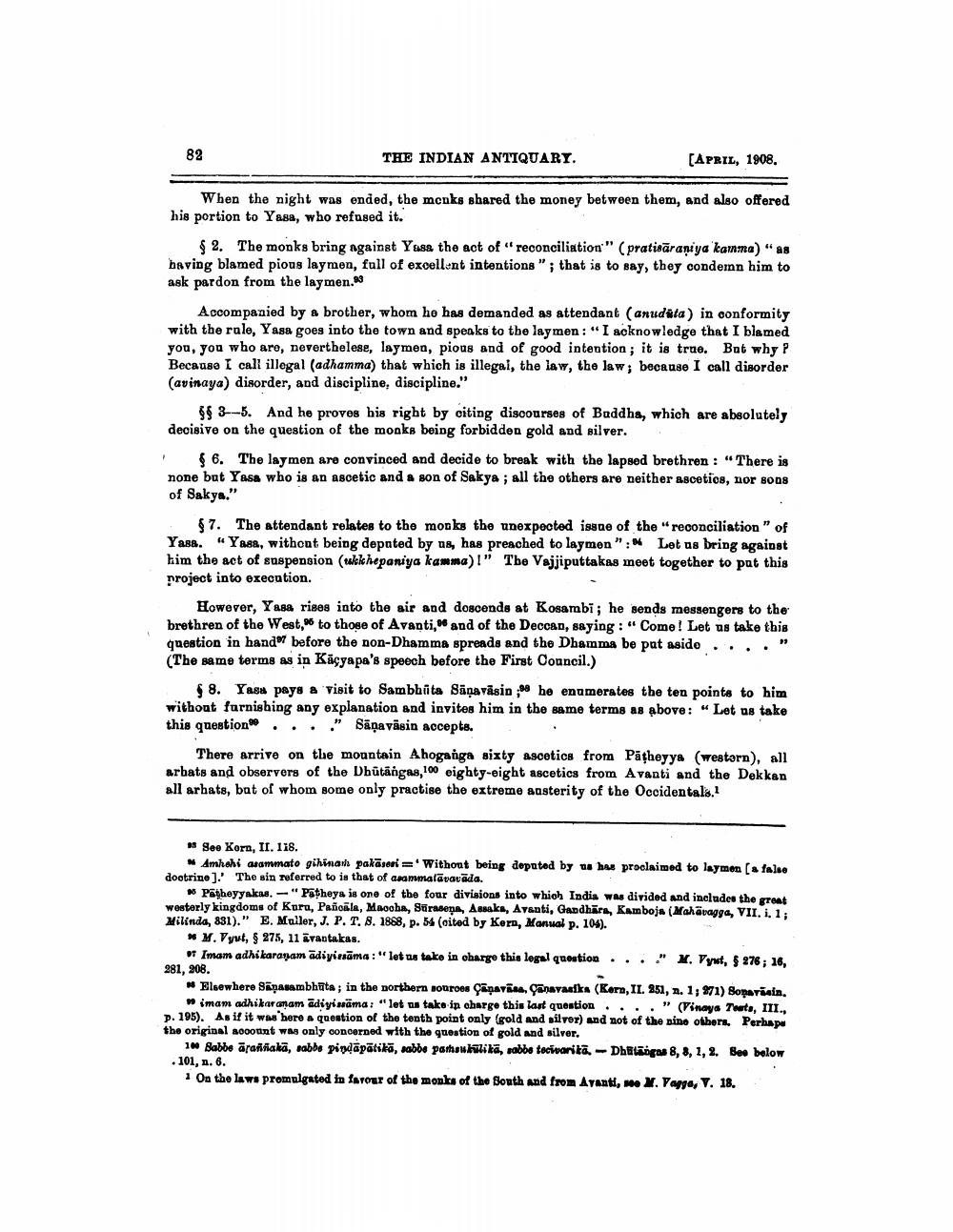________________
82
THE INDIAN ANTIQUARY.
[APRIL, 1908.
When the night was ended, the monks shared the money between them, and also offered his portion to Yasa, who refused it.
§ 2. The monks bring against Yasa the act of "reconciliation" (pratisaraniya kamma)" as having blamed pious laymen, full of excellent intentions"; that is to say, they condemn him to ask pardon from the laymen.89
Accompanied by a brother, whom he has demanded as attendant (anudita) in conformity with the rule, Yasa goes into the town and speaks to the laymen: "I acknowledge that I blamed you, you who are, nevertheless, laymen, pious and of good intention; it is true. But why? Because I call illegal (adhamma) that which is illegal, the law, the law; because I call disorder (avinaya) disorder, and discipline, discipline."
§§ 3-5. And he proves his right by citing discourses of Buddha, which are absolutely decisive on the question of the monks being forbidden gold and silver.
6. The laymen are convinced and decide to break with the lapsed brethren: "There is none but Yasa who is an ascetic and a son of Sakya ; all the others are neither ascetics, nor sons of Sakys."
§7. The attendant relates to the monks the unexpected issue of the "reconciliation" of Yasa. "Yasa, without being deputed by us, has preached to laymen": Let us bring against him the act of suspension (ukkhepaniya kamma)!" The Vajjiputtakas meet together to put this project into execution.
However, Yasa rises into the air and descends at Kosambi; he sends messengers to the brethren of the West, to those of Avanti, and of the Deccan, saying: "Come! Let us take this question in hand before the non-Dhamma spreads and the Dhamma be put aside... (The same terms as in Kacyapa's speech before the First Council.)
8. Yasa pays a visit to Sambhuta Sanavasin he enumerates the ten points to him without furnishing any explanation and invites him in the same terms as above: "Let us take this question "Sapavasin accepts.
There arrive on the mountain Ahoganga sixty ascetics from Patheyya (western), all arhats and observers of the Dhutangas, 100 eighty-eight ascetics from Avanti and the Dekkan all arhats, bat of whom some only practise the extreme austerity of the Occidentals.1
5 See Korn, II. 118.
Amhohi asammato gihina pakaseri Without being deputed by us has proclaimed to laymen [a false doctrine]. The sin referred to is that of asammalāvavāda.
Patheyyakas." Patheya is one of the four divisions into which India was divided and includes the great westerly kingdoms of Kuru, Pañcala, Maccha, Sürasena, Assaka, Avanti, Gandhara, Kamboja (Mahävagga, VII. i. 1; Milinda, 831)." E. Muller, J. P. T. 8. 1888, p. 54 (cited by Kern, Manual p. 104).
6 M. Vyut, § 275, 11 avantakas.
Imam adhikaraṇam adiyizsama: "let us take in charge this legal question..
281, 208.
M. Vynt, § 276; 16,
Elsewhere Sanasambhuta; in the northern sources Çaṇavisa, Çaṇavasika (Kern, II. 251, n. 1; 971) Soṇavisin. imam adhikaraṇam adiyissäma: "let us take in charge this last question. " (Vinaya Teats, III., p. 195). As if it was here a question of the tenth point only (gold and silver) and not of the nine others. Perhaps the original account was only concerned with the question of gold and silver.
100 Sabbe āṛaññakā, sabbe piṇḍāpātikā, sabbe pamsukulikā, sabbe tecivarikā, - Dhutangas 8, 8, 1, 2. See below .101, n. 6.
1 On the laws promulgated in favour of the monks of the South and from Avanti, see M. Vagga, V. 18.




